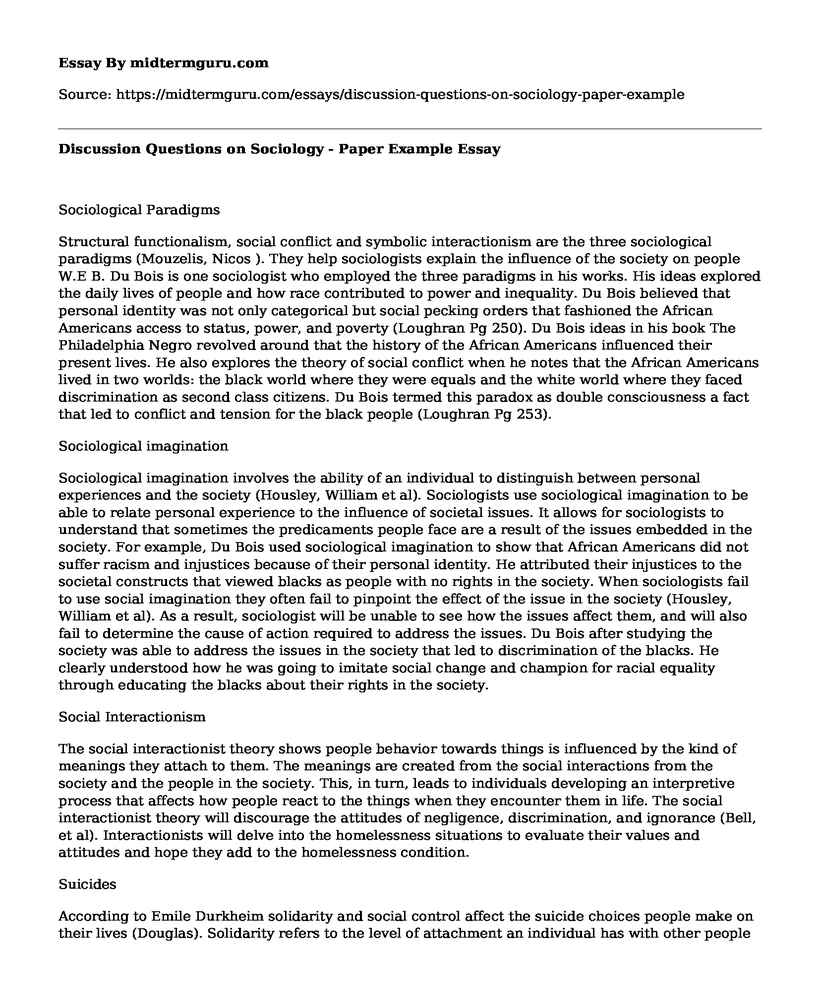Sociological Paradigms
Structural functionalism, social conflict and symbolic interactionism are the three sociological paradigms (Mouzelis, Nicos ). They help sociologists explain the influence of the society on people W.E B. Du Bois is one sociologist who employed the three paradigms in his works. His ideas explored the daily lives of people and how race contributed to power and inequality. Du Bois believed that personal identity was not only categorical but social pecking orders that fashioned the African Americans access to status, power, and poverty (Loughran Pg 250). Du Bois ideas in his book The Philadelphia Negro revolved around that the history of the African Americans influenced their present lives. He also explores the theory of social conflict when he notes that the African Americans lived in two worlds: the black world where they were equals and the white world where they faced discrimination as second class citizens. Du Bois termed this paradox as double consciousness a fact that led to conflict and tension for the black people (Loughran Pg 253).
Sociological imagination
Sociological imagination involves the ability of an individual to distinguish between personal experiences and the society (Housley, William et al). Sociologists use sociological imagination to be able to relate personal experience to the influence of societal issues. It allows for sociologists to understand that sometimes the predicaments people face are a result of the issues embedded in the society. For example, Du Bois used sociological imagination to show that African Americans did not suffer racism and injustices because of their personal identity. He attributed their injustices to the societal constructs that viewed blacks as people with no rights in the society. When sociologists fail to use social imagination they often fail to pinpoint the effect of the issue in the society (Housley, William et al). As a result, sociologist will be unable to see how the issues affect them, and will also fail to determine the cause of action required to address the issues. Du Bois after studying the society was able to address the issues in the society that led to discrimination of the blacks. He clearly understood how he was going to imitate social change and champion for racial equality through educating the blacks about their rights in the society.
Social Interactionism
The social interactionist theory shows people behavior towards things is influenced by the kind of meanings they attach to them. The meanings are created from the social interactions from the society and the people in the society. This, in turn, leads to individuals developing an interpretive process that affects how people react to the things when they encounter them in life. The social interactionist theory will discourage the attitudes of negligence, discrimination, and ignorance (Bell, et al). Interactionists will delve into the homelessness situations to evaluate their values and attitudes and hope they add to the homelessness condition.
Suicides
According to Emile Durkheim solidarity and social control affect the suicide choices people make on their lives (Douglas). Solidarity refers to the level of attachment an individual has with other people in the society. While social controls refer to social systems responsible for controlling an individuals actions (Douglas)... When an individual lacks solidarity they are likely to commit suicide because they feel alienated. Solidarity can also lead to altruistic suicides that occur when individuals values the groups interests more than their own (Douglas). Social control factors lead to suicides due to changes in the economy and social status that makes life hard for individuals. When and individuals feel like the social situations are hopeless and beyond their control, they tend to commit suicide as a way out. Hence these factors contribute to suicide being attributed to sociological issues.
Manifest and latent functions
Manifest functions refer to the functions that lead to expected outcome while latent functions are functions that lead to unexpected consequences. Drugs in the society cause a lot of crime like theft, murder, and social vices like prostitution, however sometimes drugs leads to a contribute to the economic circulation of currencies a manifest function that helps in strengthening the economy. Latent laws may include decreased crime rates due to the legalization of drugs. When drugs are legalized people will have no reason of killing each other to get the commodity because it will be readily available. However, these will lead to a social dysfunction a society that abuses drugs legally.
Works Cited
Bell, Meaghan, and Christine A. Walsh. "Finding a Place to Belong: The Role of Social Inclusion in the Lives of Homeless Men." The Qualitative Report 20.12 (2015): 1977.
Douglas, Jack D. Social meanings of suicide. Princeton University Press, 2015.
Housley, William, et al. "Big and broad social data and the sociological imagination: A collaborative response." Big Data & Society 1.2 (2014): 2053951714545135.
Hurka, Steffen, Christian Adam, and Christoph Knill. "Is morality policy different? Testing sectoral and institutional explanations of policy change." Policy Studies Journal (2016).
Loughran, Kevin. "The Philadelphia Negro and the Canon of Classical Urban Theory." Du Bois Review: Social Science Research on Race 12.02 (2015): 249-267.
Mouzelis, Nicos P. Back to sociological theory: the construction of social orders. Springer, 2016.
Cite this page
Discussion Questions on Sociology - Paper Example. (2021, May 31). Retrieved from https://midtermguru.com/essays/discussion-questions-on-sociology-paper-example
If you are the original author of this essay and no longer wish to have it published on the midtermguru.com website, please click below to request its removal:
- Paper Example on Berlo's SMCR Model of Communication
- Essay Sample on Regulation of Humanitarian Assistance
- Critical Essay on Buchi Emecheta's Second Class Citizen
- Article Analysis Essay on Online Collaboration: Scientists and the Social Network
- Ethical Behaviors in Community Interventions & Organizations - Essay Sample
- Family Planning: Navigating Ethical Challenges in Developing Nations - Essay Sample
- 2018 Bexar County Survey: 1.99M Population, 53.9K Median Income - Essay Sample







